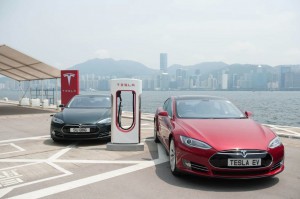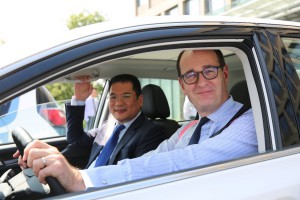
Tesla is working on a deal to build its vehicles in Shanghai, which may get accelerated if China eases ownership rules for EV makers.
The recent rush of automakers pairing up with indigenous Chinese automakers to meet tough new EV production mandates may come to a happy end for those producers as the government is mulling plans to allow them to set up shop alone.
The Chinese government is considering reversing decades-old policy requiring automakers looking to do business there to partner with Chinese companies. The move would apply only to EV makers in the country’s free-trade zones, according to Bloomberg.
Still in its preliminary stages, the move would allow a company like Tesla to set up a wholly owned operation in China, which is the biggest market in the world for EVs. It is a significant policy reversal for the country, if it comes to pass.
While carmakers have become accustomed to finding local partners to work with during the past two decades, they’ve recently been in a rush to find more tie-ups due to the government’s demand that electric vehicles must make up a quarter of all new vehicle production by 2020.
(GM’s Barra pushes for government help with China EV sales. For the story, Click Here.)
For example, Ford Motor Co. is with talking with Anhui Zotye Automobile Co. about a deal while Volkswagen AG is teaming up with Anhui Jianghuai Automobile Group Corp. Representatives from Ford and VW told Bloomberg that a policy change would be welcome, but it’s too early to speculate on what it could mean.

Jin Zheyong, left, and Peter Fleet are all smiles after signing a deal to jointly develop, produce, sell and service EVs in China.
The Ministry of Commerce, which handles China’s policy governing foreign direct investments, said it will “actively implement the opening up of the new-energy manufacturing sector to foreigners, together with other departments under the direction of the State Council.”
Bloomberg reported that the ministry also referred to a notice issued in August by the State Council, or cabinet, in which it directed government agencies to broaden foreign investor access to areas including new-energy vehicle manufacturing.
The move comes on the heels of proclamations by officials that they might consider eliminated the use of gasoline- or diesel-powered vehicles in the years ahead, following in the footsteps of other countries like Norway, France and the United Kingdom.
(Click Here to see more about China possibly banning internal combustion engine-powered cars.)
The push is on as China continues to battle air quality issues in its largest cities as the number of cars bought by citizens continues to rise. The regional governments have attempted different solutions, including restricting the number of gasoline- or diesel-powered cars that can be purchased by residents.
However, it’s all been to no avail. Several EV makers have sought to get into the Chinese market, Tesla perhaps being the most prominent; however, they are reticent to share their proprietary technology with Chinese partners. Tesla’s already had a rough start in China where it had to fight a counterfeit company who claimed to hold the naming rights for “Tesla.”
Despite the move by automakers to try to meet guidelines is likely to require more than this potential shift in policy by the government. GM CEO Mary Barra believes they’re going to need to provide some substantial incentives to consumers to lure them behind the wheel.
Barra, who was speaking at company event in Shanghai recently, said the move toward new-energy vehicles, or NEVs, will require the government to entice a market that is very comfortable with gasoline-powered cars to make the switch along with viable products.
She said that GM would work with “the timetable of governments” on the mandates, but the goal would only be hit if the government played a role with consumers.
(Automakers plead with China to delay EV mandates. For the story, Click Here.)
Barra noted the new mandates, combined with the government’s recent assertion that it may ban gasoline-powered cars altogether, did provide urgency for the automaker to develop a plan to introduce at least 10 new NEVs for the China market by 2020 and open a battery plant this year with domestic partner SAIC Motor Corp Ltd.

Hopefully Ford didn’t finalize the deal with JV (at best) Anhui Zotye Automobile Co.